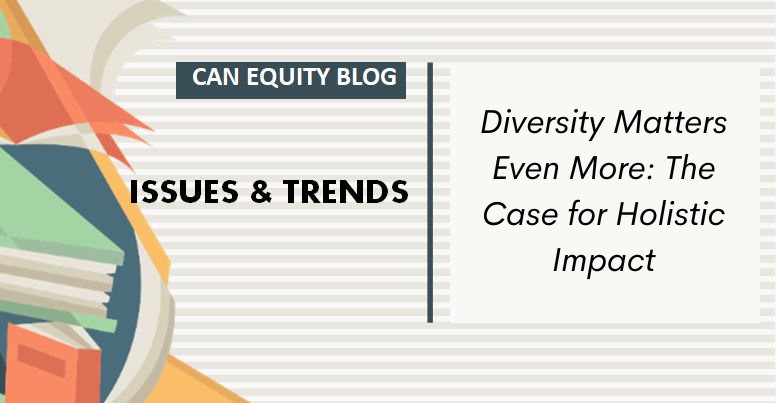
ISSUES & TRENDS: Diversity Matters Even More: The Case for Holistic Impact
This blog post is the second in a blog series by CAN on how diversity, equity and inclusion are critical to the success of private businesses. The first blog post on this topic can be found here: https://canatx.org/issues-trends-the-imperative-of-dei-in-talent-development/
A decade into their series on “Diversity Matters,” economic think tank, McKinsey & Co., releases its latest report in the series called “Diversity Matters Even More: The Case for Holistic Impact” in November 2023. This is the follow-up to the 2020 report “Diversity Wins: How Inclusion Matters” that was the 3rd in their series that showed the positive relationship between diversity at the executive and board levels and financial performance of the company. The 2020 study (that involved more than 1000 firms worldwide) reported a marked increase in the likelihood that a company that had greater gender diversity (on executive teams) would financially outperform competitors (15% in 2015 and 25% in 2022). The 2023 report (that involved more than 1200 firms worldwide) shows that companies having greater gender diversity and/or ethnic diversity on executive teams are more likely to financially outperform their competitors. Companies meeting the “women diversity” threshold were 39% more likely to outperform their competitors in 2023 (compared to15% in 2015), and companies meeting the “ethnic diversity” threshold were 39% more likely to outperform their competitors in 2023 (compared to 35% in 2015).
According to the report, companies with increased gender diversity and ethnic diversity at the Board level also have an increased likelihood that they will outperform competitors not meeting that standard. Companies who met the gender diversity threshold were 27% more likely to outperform competitors who did not, and companies who met the ethnicity standard were 13% more likely to outperform competitors who did not.
Even though gender representation and ethnic representation on executive teams and corporate boards improved slightly since 2018, overall gender and ethnic representation remains low. The proportion of women on executive teams was 20% in 2023 (compared to 14% in 2018), and the proportion of ethnic diversity on executive teams was 15% in 2023 (compared to 12% in 2018). For a cohort of 330 companies that McKinsey has been tracking since 2015, 46% are categorized as Fast Movers or Diversity Leaders when it comes to ethnic diversity, and 36% are categorized as Fast Movers or Diversity Leaders when it comes to gender diversity. Diversity Leaders have attained gender parity and equitable ethnic representation, and Fast Movers have made significant gains during that time period in gender and ethnic diversity (exceeding 32% for gender representation and approaching equitable ethnic representation for ethnic representation). This demonstrates that making significant progress on matters of diversity (gender and ethnic) can happen at a relatively rapid pace if the right focus and strategies are employed.
This particular edition of “Diversity Matters” hones-in on the corporate goal of “holistic impact” and the effect that diversity (gender and ethnic) can have on achieving “holistic impact.” So, what does “holistic impact” mean? Well, the report summarizes it as such:
- emphasizing … “the interests and needs of a wider set of stakeholders, including employees, customers, and investors;”
- prioritizing “social and environmental goals;” and
- driving “towards sustainable, inclusive growth.”
The new report cites the 2019 UN Global Compact and Accenture Strategy, CEO Study which reported that 9 out of 10 CEOs indicated that “caring about sustainability is increasingly important to the future success of their business.” There was a correlation between higher ethnic/gender diversity on executive teams and better outcomes with regard to “holistic impact.” The ratings used to measure “holistic impact” include a Community Score (business ethics; corporate citizenship & philanthropy); a Workforce Score (talent attraction/retention; labor practice indicators); and an Environmental Score (operational eco-efficiency; climate strategy).
The final section of the report outlines specific actions corporate leaders can take to advance diversity in leadership (i.e., on the executive team/board) in a way that actually produces the desired impacts outlined above. Success involves more than just hitting the desired targets for representation. Based on interviews with leadership team members (that are diverse in terms of ethnicity or gender), the five strategies business leaders should consider pursuing are:
1. Commit to a systematic, purpose-led approach to benefit all stakeholders.
Actions must be part of a company’s core mission and values, not just something to which you pay lip service.
2. Embed your strategy in company-wide business initiatives while tailoring to local context.
Strategies should factor-in local context. The best outcomes will come when a company understands and works to address local diversity, equity and inclusion (DEI) community needs and corporate expectations. If a company has a footprint in multiple communities, then a company-wide strategy can be informed by the myriad of local efforts.
3. Prioritize belonging and inclusive practices to unlock performance.
Employee recruitment and training strategies should include a DEI lens at all levels. Considering your customer/client-base may help guide the company on specific strategies to utilize. Meaningful and sustained support for affinity groups and “employee resource groups” (ERGs) is also critical.
4. Embolden and activate champions and allies by providing adequate resources and support.
When you have leadership team members (of diverse backgrounds) and allies who are going above and beyond to support DEI efforts, the company should more intentionally recognize their efforts and support them. Such actions not only benefit the individual employee(s), but they also set a corporate climate in which other DEI leaders and allies can feel comfortable and thrive.
5. Act on feedback, including dissenting voices.
Routine opportunities to provide feedback on DEI efforts are essential to creating the right climate and capturing valuable insights. Engaging thoughtfully with employees who provide dissenting opinions can be critical for the purposes of identifying the root source of challenges in the DEI arena.
Raul Alvarez
CAN Executive Director